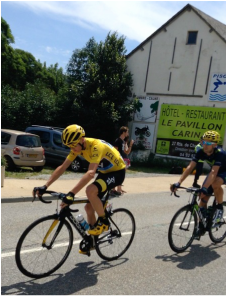|
(Sam Toperoff lives in the Alps with his family. He played basketball at Hofstra and later taught there and has had an admirable career writing books and documentaries before retiring in France. The Tour de France has been in their region in recent days; I suggested he send his impressions.
(At first, Sam was going to write from the largest town, Gap, but then he wrote why that was not possible: (“Local shepherds will be staging a manifestation – protest -- because the government is protecting wolves, which they claim are attacking their flocks. Italy, just across the mountains, doesn't have a wolf problem because the shepherds sleep with their flocks; French shepherds do not. Still, the local shepherds plan to disrupt the Tour by loosing 3,000 sheep when the cyclists approach Gap. Seriously. I'm not making this up; this is France, and I love it.” (Instead, Sam waited until Thursday, and he wrote these words and his daughter Olivia took some photos.) By Sam Toperoff Good evening Mr. and Mrs. North America and all the ships at sea, let's go to press. (It's an opening that takes me back to my childhood and so does riding a bike around Laurelton, Queens, when I was about nine or ten.) I always thought bikes were for kids. Not in Europe they ain't! I've never been as taken with the Tour de France, the best bike-riding ever, since I watched the great Bernard Hinault bike past me to victory forty years ago on an uphill climb I could barely manage while walking. I had found myself in the French Alps par hazard and since there were no basketballs around and no one to hit fungoes to, I had to start biking. Frankly, it was the most demanding physical activity I'd ever engaged in. I biked these hills in summer until I was seventy. I actually put the bike away on my birthday after I came up two hairpin turns from a road below my house and barely made it. The other day, to win the 18th stage of this year's Tour, Romain Bardet went up scores of hairpins and scaled the Alps themselves during a 170-km. race while being chased by 170 other world class riders. These are remarkable athletes indeed because of the physical and mental demands they face daily over three-week period. All in all, the race is over 2,000 miles. Bardet is a young Frenchman, and a Frenchy winning even a stage has become a rarity these days; no one from Gaul has won the Tour since the above-mentioned Hinault, who did it thirty years ago! And so tonight, French television is nothing but Bardet, Bardet, Bardet. Of course, it's hard to watch the Tour without wondering how these men can do what they do, especially when it comes to their need to recover overnight after such enormous effort. Even though all of Lance Armstrong's victories have been vacated because of his now-admitted use of illegal stimulants, it is hard to watch such remarkable performances and not remain somewhat cynical. The Director of the Sky Team, for whom Christopher Froome rides, the Englishman Sir David Brailsford, is on television almost daily assuring viewers (his French is perfect) that his team is clean. "I don't blame people for being cynical," he said the other day, "but other than the unlimited testing of my team and giving the public my word, what can I do?" The shadow of Lance Armstrong still shades the Tour. I despise him for what he did. Worse, he put doubt in my appreciation of what I am witnessing; cynicism's worst effect is that it robs one of pleasure. And poor Chris Froome -- a truly great rider -- and young Romain Bardet -- and my particular favorite Alberto Contador -- they all become objects of suspicion. Nevertheless, I'll be in front of my set for tomorrow's stage.” Merci, Sam.
Lew Freifeld
7/23/2015 09:31:49 am
Anything Sam Toperoff writes about is worth reading, even if its about athletes in tight colorful uniforms riding a bike!
Curt Block
7/23/2015 10:10:28 am
I've never read six words about the Tour but I'm anxiously waiting 7/23/2015 10:27:38 am
Sam is always a joy to read and his description makes you feel that you are there.
Michael Foerster
7/23/2015 09:31:22 pm
As usual with anything written by Sam, one gets sucked into the story and hopes the ride never ends...
Theresa Statz-Smith
7/24/2015 05:11:37 am
More. More. Sam could write about mushrooms growing and I'd read it over and over again! Lucky France!!
Josh Rubin
7/24/2015 05:50:52 am
Yes to all above, Not to mention there must be more to be told about the sleeping arrangements and wolf defense strategies of shepherds in various European nations.
Brian Savin
7/25/2015 10:53:12 pm
i fail to understand the author's differentiated feelings about Armstrong and Contador. On Armstrong, GV's complications ring the bell for this reader. Macur did a good piece, too. 8/3/2015 10:53:33 pm
I love France, next month we planned to go their with my family members. Comments are closed.
|
Categories
All
|











